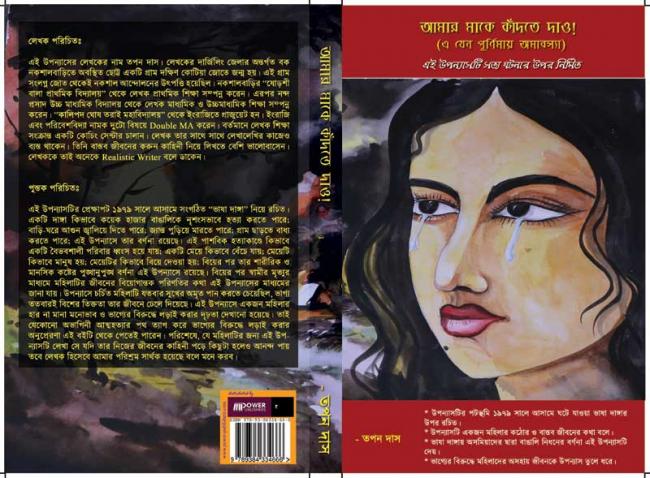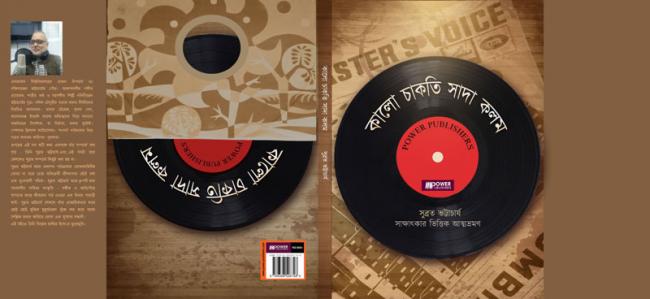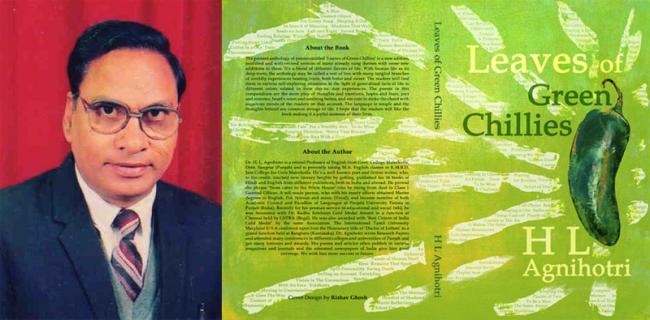Author interview: Uttarayan Deb on his Bengali book ‘Bachai Pyanchforn 50’-News in Twfindia
Author interview: Uttarayan Deb on his Bengali book ‘Bachai Pyanchforn 50’
By: IBNS

By: IBNS

The book aims to break common myths, especially among young aspirants, about starting a career in banking, says author Divesh Mishra, who has worked with two leading banks, SBI Group and HDFC.
Congratulations on the release of ‘Simple Guide to Banking’. Have you been a banking professional?
For 34 years, of which the first 11 years with the State Bank Group and the last 19 years with HDFC Bank. I am fortunate to learn many things at these two great institutions.
What made you write a book on the subject of banking?
Banking is not taught in the class rooms. As a result, there are many misunderstandings about a career in banking, such as one needs to be a commerce student, a CA, or an MBA, must hail from a large city or to be having bankers in the family. Banking is fun and anyone having a flair for meeting people and an ear to listen can flourish as banker. I want to tell young boys and girls from the small towns and from little known colleges that they stand a fair and an equal chance to become top bankers. They just need to master the basics.
Do you feel most titles on banking do not give readers a clear idea about the subject?
I am not qualified to answer this as I have not read all the books on banking.
Which reader base are you targeting with your book?
Young boys and girls, homemakers, pensioners, people in uniform. All those who though that the banking industry runs like a club. However, this book is principally aimed at those young minds who aspire towards a career in the banking and financial sector.
What support and guidance did you receive in the process of writing this book?
Anything that I possibly could ask for. Ex-colleagues, family, my current team. Everyone happily contributed.
NITN | @notintownlive | 21 Feb 2018

“Amar ma ke kandte dao”, a Bengali novel written by Tapan Das, is about the life of an innocent girl, Tapashi, who loses everything after Assamese zealots ruthlessly attack her Bengali parents.
This story is actually based on true events and it presents a sad picture of the horrifying anti-Bengali movement that shook Assam.
Another theme that has been explored in this story is that the fates of some people are mired in misery and no matter how much they try, they never seem to run away from all the impending disasters.
This novel is set in the quaint little village of Mukundapur, in Assam. Tapashi is the only child of a rich village head, Radhanath. She was born to Radhanath and his wife after many years of their marriage.
She grows up to be a kind-hearted, sweet, and loving child, and soon becomes the apple of everyone’s eyes. It seemed as if little Tapashi was born with a silver spoon in her mouth.
Soon things begin to fall apart after her family is attacked by a few overzealous Assamese men due to some misplaced anger on Bengalis. Tapashi’s parents die in front of her eyes but her governess flees with her to safety.
But life has worse things in store for her yet because once someone loses his or her parents, then that loss becomes irredeemable.
Tapashi’s governess, her Sona Ma, turns out to be a greedy woman who starts using Tapashi’s property to raise her own children, and keeps Tapashi at home, without letting her get educated.
Tapashi is taught all kinds of household chores. In essence, she becomes a maid in her governess’ house.
The rest of the story follows Tapashi’s journey as she grows up and faces the various challenges that life throw at her.
This story throws light on the anti-Bengali movement that had swept through Assam during 1975-80.
Tapashi is a representative of the countless rural women who are exploited by their relatives and friends, who are deprived of all kinds of opportunities for self-growth.
The sad part is that such situations are still true and reading stories like these just make us realise that we all need to become more active in reaching out to such hapless women and help them find their footing.
The other characters who inhabit Tapashi’s world are also strongly reminiscent of people who we see in our daily lives.
Books like these just enhance the legacy of our rich literary world.

By: IBNS


Some Suitable Words by Pijush Biswas is a collection of beautiful poems, where the author bares his kindly heart, describing the divinity of nature and the social happenings around him.
The poems capture the author’s emotions in a unique way.
The author frequently asks engaging questions, which help the readers to connect with the tenor of the poems and reflect on them.
This poetry is also an allegory of the poet’s consciousness. For example, in the poem ‘If Thou Hadst Become Hot Summer Of Darling May’, he makes allegorical use of the sun, rain, humming birds, and the garden.
Again, in ‘The Sun and the Moon’, he talks about how both the sun and the moon fills his mind with bliss when he looks at them.
His work has an allegorical, literary, and a symbolic significance, which helps us embark on a beautiful journey through the mind’s eye of the author.
The tone of the poems reveals a sense of self-introspection and serious realization by the writer, who seems to make profound observations of the happenings around him.
However, he is not all despondent and forlorn, but full of hope for a brighter future that awaits.
We also note the author’s usage of archaic English here.
His treatment of the language consists of old English words like thou, hadst, thy, thee, etc, which gives a lyrical tone to the poems.
Titles of the poems also reveal much about the writer’s love for nature. Poems like ‘Spring Love’, ‘Summer Is Mere a Dream’, ‘Winter’, ‘The Rainy Season’, and ‘As I Wander To Seek Beauty’ tell us how mesmerized he is by the nature around him.
He sees nature in everything—the daffodils, birds cooing, humming of the bees, gardens sprouting lovely flowers, the fountains, and the hills. He admirably expresses the simplicity and tranquility of nature.
He also asks everyone to come forward and do their bit in the development of the country.
In many poems, emotions like love, pity, and mercy have been dealt with in a sublime manner.
Imagery is a key theme of his poetry, where the poet has invoked nature and its different aspects as symbolic to the mood described in the poems.
Some Suitable Words is a highly recommendable book for all, an insight into the deep thoughts, which come out through nature’s beautiful depictions and creative introspection.
Let’s look at some lovely lines from the poem ‘Winter’:
Now, Winter, Spring’s colonial bride
Steeped into ornaments—
White snowflakes, and bare trees.
And waits awhile to capture her domain
While the dying year passes by.
(Reviewed by Sukanya Sur)
NITN | @notintownlive | 13 Mar 2018

“Kalo Chakti Sada Kolom” is the autobiography of musician and artist, Subroto Bhattacharya, written in the format of an interview, where the author himself is asking the questions and answering them too.
It isn’t everyday that we get to have a sneak peek into the life of a musician and it is only when unconventional men like Bhattacharya decide to share their stories with us that we get the privilege of knowing and understanding artists like him.
Celebrities are being interviewed all the time by the media, but there are people who stay in the background, whose expert support makes the celebrities who they are.
It isn’t very often that we get to hear about such background musicians and technicians.
The lives of these background musicians are just as fascinating and awe-inspiring as the stories of the celebrities who come to the forefront.
So, in the very beginning of the review, I would like to thank Subrata Bhattacharya for deciding to share his story with the world.
The author hails from an illustrious family, whose members have left their individual marks in their chosen fields.
His grandfather and father were acclaimed musicians but the author says that he was never focused enough to carry on with his musical training, though he was just as talented as his family members.
The early demise of his father left a vacuum in his life that interfered with his all-round growth and emotional stability.
He was so disturbed by certain circumstances in life that he dropped out of school after the eighth grade.
But bookish knowledge is not what makes a man educated and that’s what happened with Bhattacharya as well.
Life taught him the most vital lessons and soon he started finding his way in life.
His life is filled with extraordinary achievements.
And as he shares his journey with us, we get to learn about some wonderful and unthinkable incidents about some of the most loved artists in India.
The author talks expansively about the legendary musician and singer, Salil Choudhury. His experiences with veteran artists like Lata Mangeshkar, Asha Bhosle, Laxmikant, and other stalwarts make for an exciting read.
As the story continues, we realise that true passion and talent will always find its way in the world.
True artists are born unconventional; their minds will never work in the expected ways and that is why they always manage to stand out from the crowd.
Apart from the story itself, the format of the book is what makes the book so riveting.
The author asks all the relevant questions at the right time and we get the most interesting answers from the author himself—again the mark of an unconventional mind at work.
(Reviewed by Priya Das)
“Atosh Kach” is a recently published anthology of fifteen Bengali short stories written by Subrata Bhattacharya.
Each of these stories have been woven with so much emotion and love that the readers will be left awed by the expertise of the author.
Let’s discuss a little bit about my favourite stories in the book.
The first story would be, “Golper Chchole”.
In this story we have a young entrepreneur who is trying to start a new division in their publishing house all by herself. Besides this, she is also a caring girlfriend who is constantly on the lookout for great stories that can be turned into scripts for her boyfriend, who is a film maker by profession. In this process, she comes across a book that seems to have some personal connections with her family. Unable to contain her curiosity she sets out on a mission to search the enigmatic author and what she discovers in the end may not change her life in her anyway, but it definitely changes something inside her heart, it teaches her something about the vulnerability of life.
This story is beautiful, not because it has some great morals or some great characters. It is the art of storytelling that makes this story a standout piece for me. The revelation that comes in the end of this story is startling and sobering all at once.
The second story that I would like to discuss here is “Chchondo”, undoubtedly, the best story of the anthology.
This is a love story between a dancer and a tabla player. Yes, love can be of all sorts, but the way the love story develops here is awe-inspiring and honestly, it just makes you ache for a relationship this pure and this true, because how many people are lucky enough to get connections like these?
This is a fairy tale told in the backdrop of a harsh and real society. Yes, true relationship is way beyond physicality. It is about respecting and being respected.
The other story that is remarkable is “Obohelito o Oporiharjo”.
In this story we get a young girl who develops a deep bonding with her father’s employee. After all, you never know where you find your true friends. The man accepts the little girl as his own daughter. Everything is lovely in the family, but what secrets is the man hiding from his adopted family? What lies behind him? The girl grows up slowly to go missing from home one day, but her uncle is confident that he can bring her back. The uncle succeeds, but part of his past comes back with the girl. Again, superb writing skills and an excellent plot.
Authors like Bhattacharya and books like these make readers like us hopeful about the future of Bengali literature.
(Reviewed by Priya Das)
By: IBNS

NITN | @notintownlive | 26 Mar 2018

While the leaves signify the freshness of the poems, the chillies represent the irony in them, says author HL Agnihotri about his anthology of poems.
Congratulations on the release of ‘Leaves of Green Chillies’. What does the title suggest?
The title of my book ‘Leaves of Green Chillies’ is just like the silver crown on the head of a beautiful girl as it reflects the mind and soul of my book.
​Do you research a lot while writing a book?
Every writer, in a way, is a researcher— the researcher of current and burning issues, life-like characters with pulsation of life, and good style. A good writer is always in search of new words and new phrases.
You have got several published titles till date. How is the current title different from the rest?
I have spent a lot of time to decide on the title so that it is somewhat different from others. Leaves stand for greenery and freshness of my poems; whereas green chillies stand for the pinch of bitterness that equates more with the irony in my poems. On the whole, green leaves and green chillies reflect greenness and freshness of my book.
What kind of books do you enjoy reading?
I like reading literary books that give me new ideas and rich emotions and passions that inspire me to write. My eye is always on new methodology and techniques that may give new direction to my writings.
What inspires you as a writer?
Good, natural and spontaneous ideas and emotions inspire me to write poetry. I’m inspired from such writings that engross my mind and touch the inner depth of my heart for inspiration.